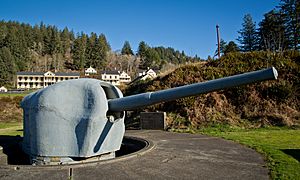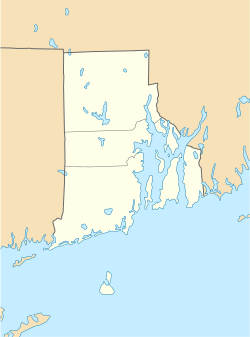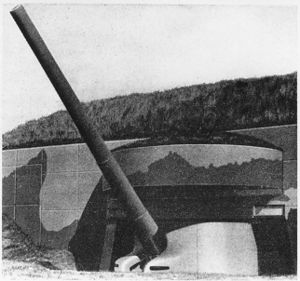Fort Greene (Narragansett, Rhode Island) facts for kids
Quick facts for kids Fort Greene |
|
|---|---|
| Part of Harbor Defenses of Narragansett Bay | |
| Point Judith, Narragansett, Rhode Island | |
|
Location in Rhode Island
|
|
| Coordinates | 41°22′53″N 71°29′00″W / 41.38139°N 71.48333°W |
| Type | Coastal Defense |
| Site information | |
| Owner | US Army Reserve, State of Rhode Island |
| Controlled by | US Army Reserve, Fishermen's Memorial State Park |
| Open to the public |
yes (part) |
| Site history | |
| Built | 1943 |
| Built by | United States Army |
| In use | 1943-present |
| Battles/wars | World War II |

Fort Greene is a place in Narragansett, Rhode Island, where the United States Army Reserve trains. During World War II, it was a very important fort. It was built to protect the coast of Rhode Island.
Fort Greene had powerful guns, even stronger than older forts in the area. It worked together with Fort Church to guard Narragansett Bay. The fort is named after General Nathanael Greene, a hero from the American Revolutionary War who was born in Rhode Island.
Contents
History of Fort Greene
Fort Greene was built around 1940. This was when the United States decided to make its coastal defenses much stronger. A big war had started in Europe, and they wanted to be ready.
The plan was to replace old guns with new, powerful ones. These new guns included very long-range 16-inch guns. Smaller 6-inch guns were also added. The biggest guns were placed inside strong concrete bunkers called casemates. This protected them from attacks from the air.
Protecting the Coast
The main job of Fort Greene was to protect the entrance to Narragansett Bay. Its powerful guns could shoot over 45,000 yards (about 25 miles). This meant it could also help protect the eastern part of Long Island Sound.
Fort Church, located across the bay in Little Compton, was a similar fort. Together, they formed a strong defense line.
Building the Fort
The land for Fort Greene was bought between 1939 and 1942. It was first called the Point Judith Military Reservation. The fort was split into three main areas. The East Reservation is where the Army Reserve Center is now. The West and South Reservations are now part of Fishermen's Memorial State Park.
- Battery Hamilton (BCN 108): This battery was on the East Reservation. It had two huge 16-inch guns.
- BCN 109: This battery was on the West Reservation. It was designed for two 16-inch guns, but they were never put in place.
- BCN 211: This battery was on the South Reservation, near Point Judith Light. It had two 6-inch guns. There were also four round concrete pads for smaller, movable 155 mm guns.
Near BCN 109, there was a special bunker. This bunker was used for plotting where enemy ships were and for radio communication.
After the War
After World War II ended in 1947, the guns at Fort Greene were removed. Most other US coastal artillery weapons were also taken out of service around this time.
Some small buildings were also part of the fort's defense system. These were called fire control stations. They looked like beach cottages. They helped soldiers figure out where to aim the guns. Most of these buildings are gone now, but some have been fixed up at the Camp Varnum National Guard facility.
Fort Greene Today
Today, you can still see parts of Fort Greene.
- The former 16-inch gun battery (BCN 109) is in the campground of Fishermen's Memorial State Park. Even though it never had guns, the structure is still there. The plotting and radio bunker is also in the park.
- The Fort Greene Army Reserve facility is on the East Reservation. This area includes the former 16-inch Battery Hamilton.
- The former 6-inch gun battery (BCN 211) is near Point Judith Light. It's also part of the state park. The Fishermen's Memorial is right next to this bunker. You can even walk on top of the bunker.
Gallery
 | James Van Der Zee |
 | Alma Thomas |
 | Ellis Wilson |
 | Margaret Taylor-Burroughs |







